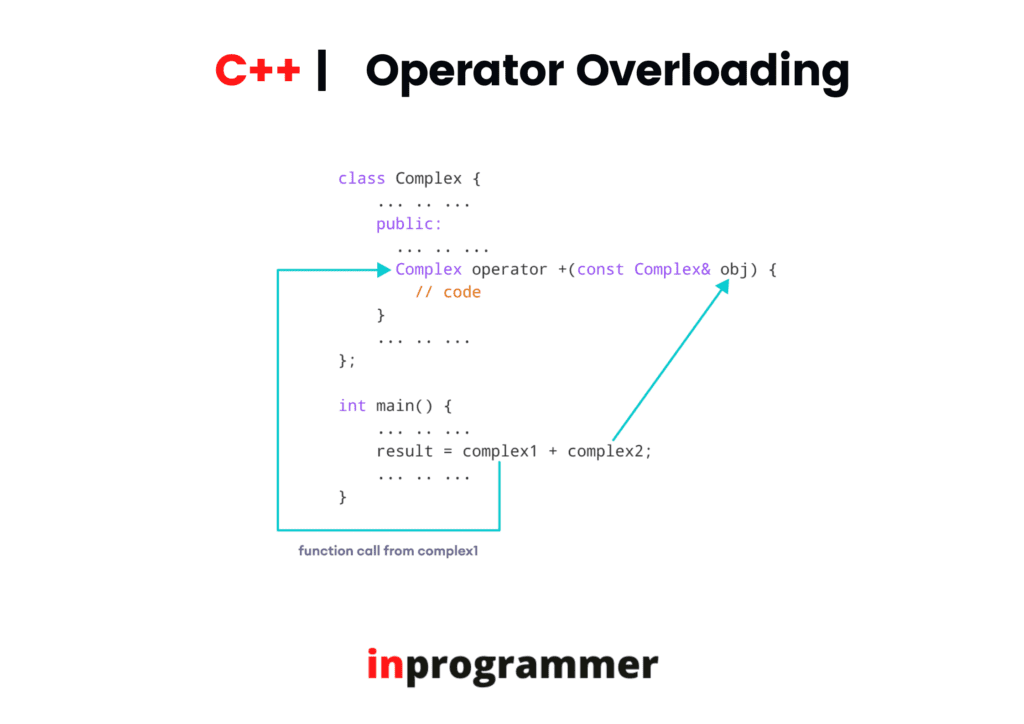We have learned about objects and methods. Now, let’s learn about Operator Overloading in C++.
Operator Overloading
In C++ programming language, we can overload operators, i.e., make operators work for user-defined classes. This means C++ has the ability to provide the operators with a special meaning for a data type, this ability is operator overloading.
For example, we can overload the ‘+’ operator in a class like String to concatenate two strings just by using the ‘+’ operator. Other examples where arithmetic operators may be overloaded are Complex Numbers, Fractional Numbers, Big Integers, etc.
As we have already seen polymorphism, operator overloading is one example of compile-time polymorphism. It is an idea of giving special meaning to an existing operator in C++ without changing its original meaning.
Example:
int a;
float b, sum;
sum = a+b;In the above example, the variables ‘a’ and ‘b’ are of types “int” and “float”, which are built-in data types. Hence the addition operator ‘+’ can easily add the contents of “a” and “b”. This is because the addition operator ‘+’ is predefined to add variables of built-in data type only.
Now let’s look at another example,
class A
{
};
int main()
{
A a1,a2,a3;
a3= a1 + a2;
return 0;
}
In this example, we have 3 variables “a1”, “a2” and “a3” of type “class A”.
Here we are trying to add two objects “a1” and “a2”, which are user-defined types i.e. of type “class A” using the “+” operator. This is not allowed, because the addition operator “+” is predefined to operate only on built-in data types. But here, “class A” is a user-defined type, so the compiler generates an error. This is where the concept of “Operator overloading” comes in.
Now, if the user wants to make the operator “+” add two class objects, the user has to redefine the meaning of the “+” operator such that it adds two class objects. This is done by using the concept “Operator overloading”. So the main idea behind “Operator overloading” is to use C++ operators with class variables or class objects. Redefining the meaning of operators really does not change their original meaning; instead, they have been given additional meaning along with their existing ones.
Example:
#include<iostream>
using namespace std;
class Complex {
private:
int real, imag;
public:
Complex(int r = 0, int i = 0) {real = r; imag = i;}
// This is automatically called when '+' is used with
// between two Complex objects
Complex operator + (Complex const &obj) {
Complex res;
res.real = real + obj.real;
res.imag = imag + obj.imag;
return res;
}
void print() { cout << real << " + i" << imag << '\n'; }
};
int main()
{
Complex c1(10, 5), c2(2, 4);
Complex c3 = c1 + c2;
c3.print();
}
Output:
12 + i9Now that we know operator overloading and how to use it to overload predefined operators you might get a question, can we overload all operators?
Almost all operators can be overloaded except a few. Following is the list of operators that cannot be overloaded.
- sizeof
- typeid
- Scope resolution (::)
- Class member access operators “.” (dot), “.*” (pointer to member operator)
- Ternary Operator (?:)
Operators that can be overloaded
We can overload the following operators:
- Unary operators
- Binary operators
- Special operators ( [ ], ( ) etc)
That is all for this article, Happy Coding!


